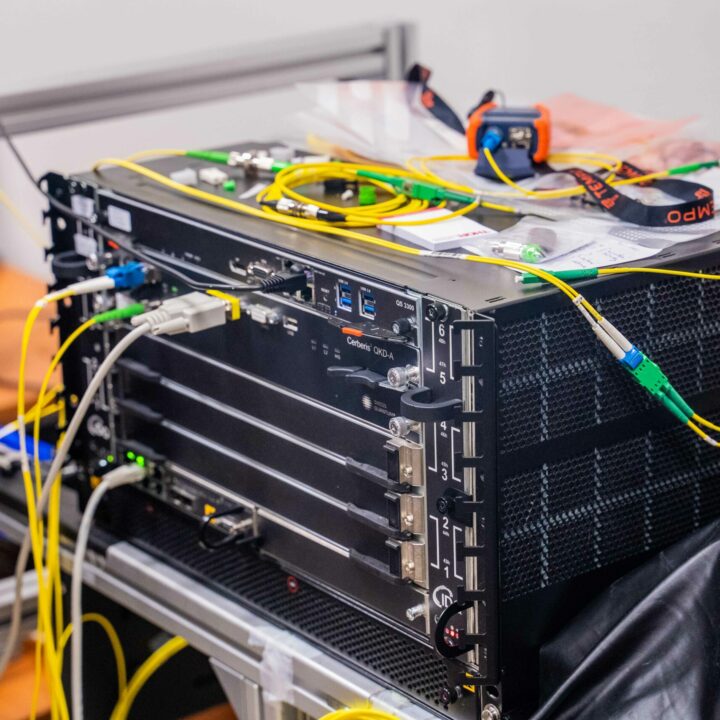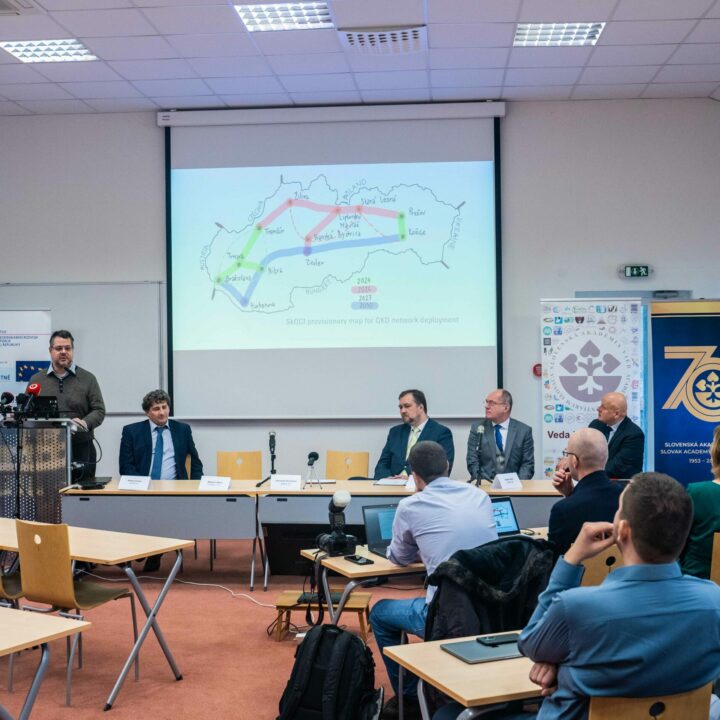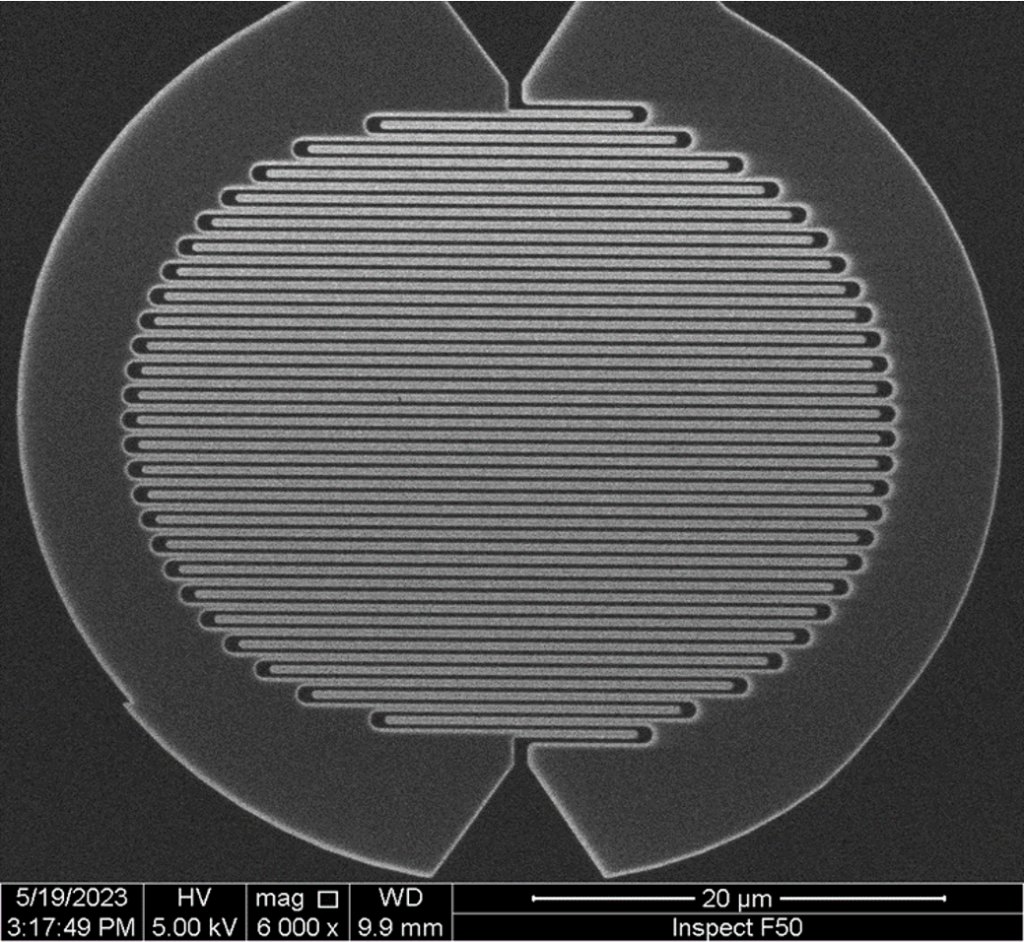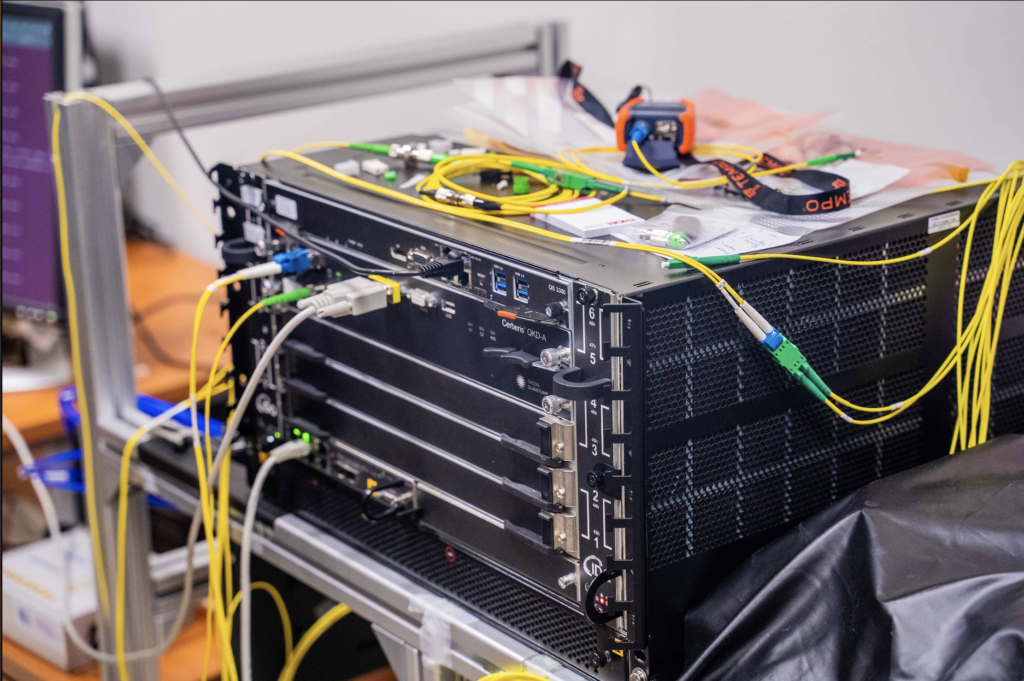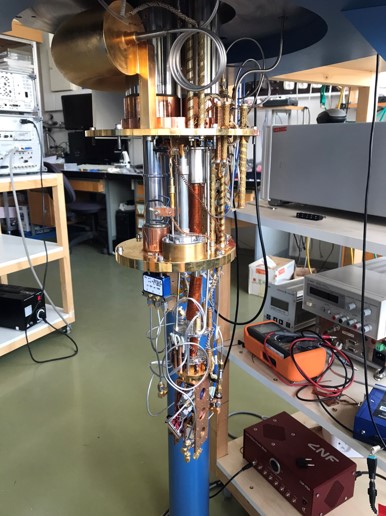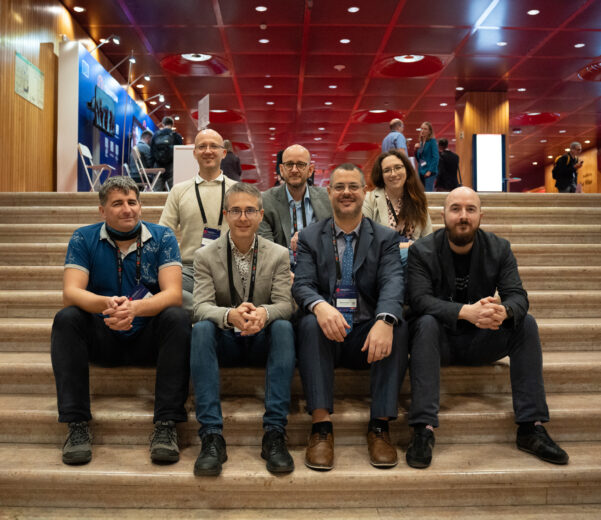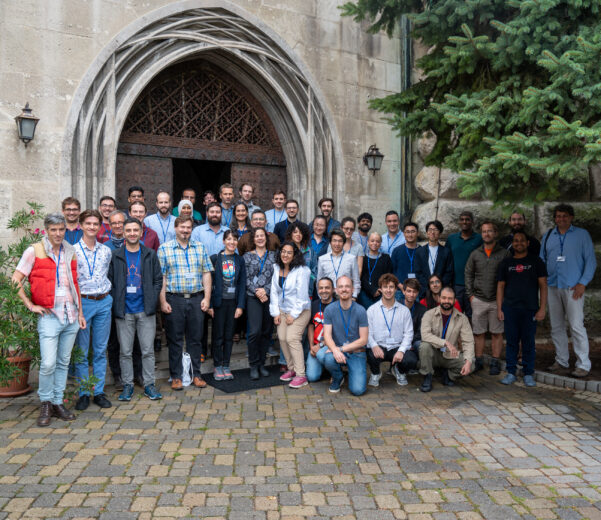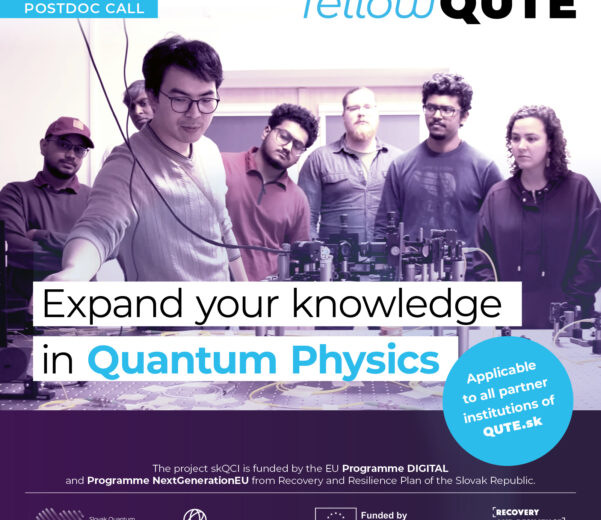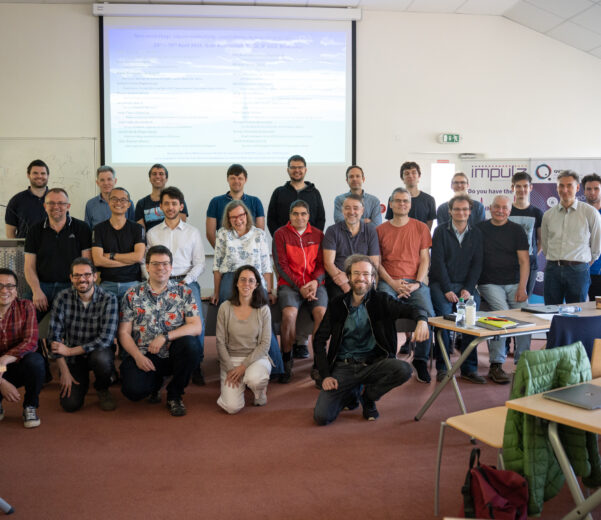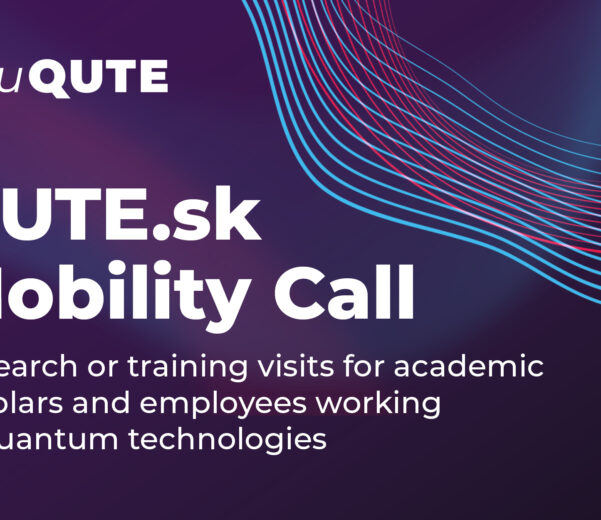
Virtual institute of quantum technologies iQUTE
iQUTE will bring together individual research teams and guarantee the sustainability of excellent research.
The iQUTE institute covers research activities of the interested partners and performs expert and popularization activities.
iQUTE’s research is focused on:
- basic research of qualitatively new quantum-IT structures, certification, and optimization of quantum technologies,
- development of efficient algorithms for quantum systems simulations,
- analysis of computational complexity of physical systems,
- and design of secure communication protocols.
The key strategic goals of the iQUTE platform are focused on theoretical modeling and experimental development of quantum hardware in superconductor and semiconductor systems, implementation of quantum detectors, quantum memory, and quantum “repeater” for the needs of the global quantum network (quantum internet).
Theory of quantum information structures
Quantum bit implementations
Hybrid superconductor or semiconductor systems are promising candidates for quantum bits. We intend to participate in the research of theoretical models for “quantum dots” in silicon and molecular nanomagnets, which have two significant properties for quantum computing:
Quantum simulations and computational complexity
The development of state-of-the-art simulation methods for large quantum mechanical systems and their application in solid-state physics and quantum chemistry. Quantum simulations are an area where the most significant applications of medium-sized and slightly noisy quantum chips developed in the near future are expected. This intention includes the design of new algorithms to study properties of quantum phases (topological arrangements) for the analysis of hyperbolic geometries of spacetime (quantum theory of gravity), fractal structures, and multidimensional quantum states of particles.
Since simulations are inherently challenging, the second goal of this intent is to understand the computational complexity of simulation and optimization tasks that occur in industrial applications (chip transistor layout design, image recognition) and solid-state physics (finding the lowest energy states, understanding correlations). The result will be not only basic research at the border of theoretical computer science and quantum physics but also practical, more efficient optimization algorithms that make full use of available quantum resources (coupling, superposition, tunneling).
Quantum and postquantum communication networks
Quantum communication infrastructure is mainly a research infrastructure, and its construction and optimization are the subject not only of engineering but also of experimental and theoretical research. As part of this plan, we will focus on experimental testing of various alternatives and approaches, a new protocol for implementation-safe quantum communication, secure distribution of cryptographic keys (interconnected quantum states), and the development of efficient and unconditionally secure post-quantum (asymmetric) cryptography. The question of a safe combination of standard symmetric and post-quantum asymmetric cryptography with quantum key distribution and the use of combined protocols will also be interesting.
Our results are based on cooperation
Department of Experimental Physics (Comenius Univesity, FMPH)
Oddelenie bezpečnosti informačných systémov (UIM FEI STU)
Project overview
DeQHOST - Designing quantum higher order structures
APVV-22-0570
- Project Duration:
01/07/2023 - 30/06/2026 - Project Investigator:
Dr. Djeylan Aktas
(IP SAS, Bratislava)
BIQuaN – Backbone of an International Quantum Network
SASPRO2 1156/01/01
- Project Duration:
01/10/2022 - 30/09/2025 - Project Investigator:
Dr. Djeylan Aktas
(IP SAS, Bratislava)
QuaSiModo – Quantum Simulations and Modelling of Interaction Networks
SASPRO2 1156/01/01
- Project Duration:
01/01/2022 - 31/12/2025 - Project Investigator:
Dr. Andrej Gendiar
(IP SAS, Bratislava)
SeCCQT – Secure Communication via Classical and Quantum Technologies
NATO SPS G5985
- Project Duration:
30/03/2023 - 28/02/2026 - Project Investigator:
Dr. Djeylan Aktas
(IP SAS, Bratislava)
SeMIOpT – Sequential measurements and incompatibility in operational theories
SASPRO2 1372/03/01
- Project Duration:
01/09/2022 - 31/08/2025 - Project Investigator:
Dr. Leevi Leppäjärvi
(IP SAS, Bratislava)
PRESPEED – Perspective electronic spin systems for future quantum technologies
APVV-20-0150
- Project Duration:
01/07/2021 - 30/06/2025 - Principal Investigator:
Andrej Gendiar (IP SAS, Bratislava) coordinated by Jozef Strečka, (UPJŠ, Košice)
skQCI – Slovak Quantum Communication Infrastructure
DIGITAL-2021-QCI-01 No. 101091548
- Project Duration:
01/01/2023 - 30/06/2025 - Project Leader:
Dr. Djeylan Aktas
(IP SAS, Bratislava)
SUPERSPIN – Superconducting spintronics and emergent phenomena in low/dimensional superconductors
Impulz IM-2021-26
- Project Duration:
01/05/2022 - 30/04/2027 - Principal Investigator:
Dr. Denis Kochan (IP SAS, Bratislava)
Our publication activity
- 2024
- 2023
- 2022
- 2021
- Lukas Cvitkovich, Peter Stano, Christoph Wilhelmer, Dominic Waldhör, Daniel Loss, Yann-Michel Niquet, Tibor Grasser: Coherence limit due to hyperfine interaction with nuclei in the barrier material of Si spin qubits | pdf |
Phys. Rev. Applied 22, 064089 (2024), doi: 10.1103/PhysRevApplied.22.064089 [arXiv:2405.10667] - Samuel Kern, Pavol Neilinger, Magdaléna Poláčková, Martin Baránek, Tomáš Plecenik, Tomáš Roch, Miroslav Grajcar: Optical and transport properties of NbN thin films revisited | pdf | Physical Review B 110, 245131 (2024), doi: 10.1103/PhysRevB.110.245131 [arXiv:2405.03704]
- Nidhin Sudarsanan Ragini, Sk Sazim: Higher-order incompatibility improves distinguishability of causal quantum networks | pdf | New Journal of Physics 26, 123003 (2024), doi: 10.1088/1367-2630/ad93f6 [arXiv:2405.20080]
- Wun-Hao Kang, Michael Barth, Andreas Costa, Aitor Garcia-Ruiz, Alina Mreńca-Kolasińska, Ming-Hao Liu and Denis Kochan: Magnetotransport and Spin-Relaxation Signatures of the Radial Rashba and Dresselhaus Spin-Orbit Coupling in Proximitized Graphene | pdf | Phys. Rev. Lett. 133, 216201 (2024) [arXiv:2402.13424]
- Emil Rizvanov, Samuel Kern, Pavol Neilinger, Miroslav Grajcar: Josephson Traveling Wave Parametric Amplifiers with Plasma oscillation phase-matching | pdf | J. Appl. Phys. 136, 174401 (2024) [arXiv:2408.16869]
- Hazhir Dolatkhah, Artur Czerwinski, Asad Ali, Saif Al-Kuwari, Saeed Haddadi: Tripartite measurement uncertainty in Schwarzschild space-time | pdf | Eur. Phys. J. C 84, 1162 (2024) [arXiv:2408.07789]
- Martin Baránek, Pavol Neilinger, Samuel Kern, Miroslav Grajcar:
Numerical modeling of SNSPD absorption utilizing optical conductivity with quantum corrections | pdf | Opt. Quant. Electron. 56, 1730 (2024) [arXiv:2408.00623] - Leevi Leppäjärvi, Ion Nechita, Ritabrata Sengupta: Generating random Gaussian states | pdf | J. Math. Phys. 65, 082201 (2024), https://doi.org/10.1063/5.0211479 [arXiv:2401.13435]
- Sanuja D. Mohanty, Ram N. Patro, Pradyut K. Biswal, Biswajit Pradhan, Sk Sazim: Trade-off between Bagging and Boosting for quantum separability-entanglement classification | pdf | Quantum Information Processing 23, 273 (2024) [arXiv:2401.12041]
- Teiko Heinosaari, Leevi Leppäjärvi, Martin Plávala: Encoding and decoding of information in general probabilistic theories | pdf | Int. J. Quantum Inf. 2440007 (2024), https://doi.org/10.1142/S0219749924400070 [arXiv:2311.17522]
- Benedikt Scharf, Denis Kochan, Alex Matos-Abiague: Superconducting Diode Effect in Quantum Spin Hall Insulator-based Josephson Junctions | pdf | Phys. Rev. B 110, 134511 (2024) [arXiv:2406.08669]
- Luis F. Cárdenas-Castillo, Shuai Zhang, Denis Kochan, Fernando L. Freire Jr., Wei Chen: Detecting the spread of valence band Wannier functions by optical sum rules | pdf | Phys. Rev. B 110, 075203 (2024) [arXiv:2405.06146]]
- Jan Bouda, Daniel Reitzner: General Measurements with Limited Resources and Their Application to Quantum Unambiguous State Discrimination | pdf | Quantum Information Processing 23, 268 (2024) [arXiv:2009.05276]
- O. G. Turutanov, A. G. Sivakov, A. S. Pokhila, M. Grajcar: Josephson weak link based on proximity effect in long bi-metallic thin-film bridge | pdf | AIP Advances 14, 065214 (2024)
- Yaroslav Zhumagulov, Denis Kochan, Jaroslav Fabian: Swapping exchange and spin-orbit induced correlated phases in proximitized Bernal bilayer graphene | pdf | Phys. Rev. B 110, 045427 (2024) [arXiv:2307.16025]
- Isadora Veeren, Martin Plávala, Leevi Leppäjärvi, Roope Uola: Semi-device-independent certification of number of measurements | pdf | Phys. Rev. A 109, 062203 (2024) [arXiv:2307.13737]
- Matej Moško and William M. R. Simpson: Whose Hylomorphism? Which Theory of Prime Matter? | pdf | Ancient Philosophy Today 6, 65-91 (2024), https://doi.org/10.3366/anph.2024.0103
- Maximilian Fürst, Denis Kochan, Cosimo Gorini, Klaus Richter: Dirac Landau levels for surfaces with constant negative curvature | pdf | Phys. Rev. B 109, 195433 (2024) [arXiv:2307.09221]
- Simon Reinhardt, Tim Ascherl, Andreas Costa, Johanna Berger, Sergei Gronin, Geoffrey C. Gardner, Tyler Lindemann, Michael J. Manfra, Jaroslav Fabian, Denis Kochan, Christoph Strunk, Nicola Paradiso: Link between supercurrent diode and anomalous Josephson effect revealed by gate-controlled interferometry | pdf | Nature Communications 15, 4413 (2024) [arXiv:2308.01061]
- O. G. Turutanov, A. G. Sivakov, A. A. Leha, A. S. Pokhila, A. E. Kolinko, M. Grajcar: Some aspects of resistive-to-normal state transition by direct and microwave currents in superconducting thin films with phase slip lines | pdf | Low Temp. Phys. 50, 289–298 (2024), https://doi.org/10.1063/10.0025294 [arXiv:2401.05333]
- Nidhin Sudarsanan Ragini and Mário Ziman: Single-shot labeling of quantum observables | pdf | Phys. Rev. A 109, 052415 (2024)
- Yaroslav Zhumagulov, Denis Kochan, Jaroslav Fabian: Emergent correlated phases in rhombohedral trilayer graphene induced by proximity spin-orbit and exchange coupling | pdf | Phys. Rev. Lett. 132, 186401 (2024) [arXiv:2305.14277]
- Teiko Heinosaari, Oskari Kerppo, Leevi Leppäjärvi, Martin Plávala: Simple Information Processing Tasks with Unbounded Quantum Advantage | pdf | Phys. Rev. A 109, 032627 (2024) [arXiv:2308.07727]
- Gautam Sharma, Sibasish Ghosh and Sk Sazim: Bloch sphere analog of qudits using Heisenberg-Weyl Operators | pdf | Physica Scripta 99, 045105 (2024) [arXiv:2101.06408]
- Giovanni Scala, Seyed Arash Ghoreishi, and Marcin Pawłowski: Advantages of quantum communication revealed by the reexamination of hyperbit theory limitations | pdf | Phys. Rev. A 109, 022230 (2024) [arXiv:2308.16114]
- Natália S. Móller, Bruna Sahdo, Nelson Yokomizo: Gravitational quantum switch on a superposition of spherical shells | pdf | Quantum 8, 1248 (2024) [arXiv:2306.10984]
- Leevi Leppäjärvi, Michal Sedlák: Incompatibility of quantum instruments | pdf | Quantum 8, 1246 (2024) [arXiv:2212.11225]
- Elias J. P. Biral, Natália S. Móller, Axel Pelster, F. Ednilson A. dos Santos:
Bose-Einstein condensates and the thin-shell limit in anisotropic bubble traps | pdf | New J. Phys. 26, 013035 (2024) [arXiv:2210.08074] - O. G. Turutanov, A. M. Korolev, V. I. Shnyrkov, A. P. Shapovalov, M. Baránek, S. Kern, V. Yu. Lyakhno, P. Neilinger, M. Grajcar: Design of deeply cooled ultra-low dissipation amplifier and measuring cell for quantum measurements with a microwave single-photon counter | pdf | Low Temp. Phys. 50, 82–88 (2024), https://doi.org/10.1063/10.0023896 [arXiv:2309.14559]
- M. Hamed Mohammady and Takayuki Miyadera: Erratum: Quantum measurements constrained by the third law of thermodynamics (Phys. Rev. A 107, 022406 (2023)) | pdf | Phys. Rev. A 110, 029901(E) (2024)
- Andreas Costa, Christian Baumgartner, Simon Reinhardt, Johanna Berger, Sergei Gronin, Geoffrey C. Gardner, Tyler Lindemann, Michael J. Manfra, Denis Kochan, Jaroslav Fabian, Nicola Paradiso, Christoph Strunk: Sign reversal of the Josephson inductance magnetochiral anisotropy and 0–π-like transitions in supercurrent diodes | pdf | Nature Nanotechnology (2023) [arXiv:2212.13460]
- Alireza Gholizadeh, Maryam Hadipour, Soroush Haseli, Saeed Haddadi and Hazhir Dolatkhah: Quantum dynamical speedup for correlated initial states | pdf | Commun. Theor. Phys. 75, 075101 (2023)
- Maryam Hadipour, Soroush Haseli, Hazhir Dolatkhah and Maryam Rashidi: Study the charging process of moving quantum batteries inside cavity | pdf | Scientific Reports 13, 10672 (2023)
- Maria Polackova, Andrej Gendiar: Anisotropic deformation of the 6-state clock model: Tricritical-point classification | pdf | Physica A 624, 128907 (2023) [arXiv:2207.09132]
- M. Hamed Mohammady, Takayuki Miyadera, Leon Loveridge: Measurement disturbance and conservation laws in quantum mechanics | pdf |Quantum 7, 1033 (2023) [arXiv:2110.11705]
- Ahana Ghoshal, Soham Sau, Debmalya Das, and Ujjwal Sen: Isolating noise and amplifying the signal using weak quantum measurement and postselection | pdf | Phys. Rev. A 107, 052214 (2023)
- S. Kern, P. Neilinger, E. Iľichev, A. Sultanov, M. Schmelz, S. Linzen, J. Kunert, G. Oelsner, R. Stolz, A. Danilov, S. Mahashabde, A. Jayaraman, V. Antonov, S. Kubatkin, M. Grajcar: Reflection-enhanced gain in traveling-wave parametric amplifiers | pdf | Physical Review B 107, 174520 (2023) [arXiv:2203.02448]
- Yasin Shahri, Maryam Hadipour, Saeed Haddadi, Hazhir Dolatkhah, Soroush Haseli: Quantum speed limit of Jaynes-Cummings model with detuning for arbitrary initial states | pdf | Physics Letters A 470, 128783 (2023)
- Jozef Genzor, Andrej Gendiar, Tomotoshi Nishino: Local and global magnetization on the Sierpiński carpet | pdf | Phys. Rev. E 107, 044108 (2023)
- Karol Szałowski, Marko Milivojević, Denis Kochan, Martin Gmitra: Spin-orbit and exchange proximity couplings in graphene/1T-TaS2 heterostructure triggered by a charge density wave | pdf | 2D Materials 10, 025013 (2023) [arXiv:2211.02153]
- David Davalos, Mário Ziman: Quantum dynamics is not strictly bidivisible | pdf | Phys. Rev. Lett. 130, 080801 (2023) [arXiv:2203.13451]
- Marcus J Clark, Obada Alia, Rui Wang, Sima Bahrani, Matej Peranic, Djeylan Aktas, George T Kanellos, Martin Loncaric, Zeljko Samec, Anton Radman, Mário Stipcevic, Reza Nejabati, Dimitra Simeonidou, John G Rarity, Siddarth K Joshi: Entanglement distribution quantum networking within deployed telecommunications fibre-optic infrastructure. Proc. SPIE 12335, Quantum Technology: Driving Commercialisation of an Enabling Science III, 123350E (2023) [arXiv:2211.09051]
- Angel Gutierrez-Rubio, Juan S. Rojas-Arias, Jun Yoneda, Seigo Tarucha, Daniel Loss, Peter Stano: Bayesian estimation of correlation functions | pdf | Phys. Rev. Research 4, 043166 (2022) [arXiv:2205.03611]
- Ognjen Malkoc, Peter Stano, Daniel Loss: Charge-noise induced dephasing in silicon hole-spin qubits | pdf | Phys. Rev. Lett. 129, 247701 (2022) [arXiv:2201.06181]
- Maryam Hadipour, Soroush Haseli, Hazhir Dolatkhah, Saeed Haddadi, Artur Czerwinski: Quantum Speed Limit for a Moving Qubit inside a Leaky Cavity | pdf | Photonics 9, 875 (2022)
- Lorenz Fuchs, Denis Kochan, Christian Baumgartner, Simon Reinhardt, Sergei Gronin, Geoffrey C. Gardner, Tyler Lindemann, Michael J. Manfra, Christoph Strunk, Nicola Paradiso: Anisotropic vortex squeezing in synthetic Rashba superconductors: a manifestation of Lifshitz invariants | pdf | Phys. Rev. X 12, 041020 (2022) [arXiv:2201.02512]
- Jaroslav Pavličko, Mário Ziman: Robustness of optimal probabilistic storage and retrieval of unitary channels to noise | pdf | Phys. Rev. A 106, 052416 (2022)[arXiv:2211.07079]
- Mohd Asad Siddiqui, Sk Sazim: Mermin and Svetlichny inequalities for non-projective measurement observables | pdf | J. Phys. A: Math. Theor. 55 465301 (2022) [arXiv:2203.07103]
- Fatemeh Ahmadi, Soroush Haseli, Maryam Hadipour, Sara Heshmatian, Hazhir Dolatkhah & Shahriar Salimi: Quantum Speed Limit Time of Topological Qubits Influenced by the Fermionic and Bosonic Environments | pdf | Brazilian Journal of Physics 52, 85 (2022)
- Jose Alfredo de Leon, Alejandro Fonseca, Francois Leyvraz, David Davalos, Carlos Pineda: Pauli component erasing operations | pdf | Phys. Rev. A 106, 042604 (2022) [arXiv:2205.05808]
- Youssef Khedif, Saeed Haddadi, Mohammed Daoud, Hazhir Dolatkhah, Mohammad Reza Pourkarimi: Non-classical correlations in a Heisenberg spin model with Heitler–London approach | pdf | Quantum Information Processing 21, 235 (2022)
- Peter Stano, Daniel Loss: Review of performance metrics of spin qubits in gated semiconducting nanostructures | pdf | Nature Reviews Physics 4, 672–688 (2022) [arXiv:2107.06485]
- Yoann Pelet, Ittoop Vergheese Puthoor, Natarajan Venkatachalam, Sören Wengerowsky, Martin Lončarić, Sebastian Philipp Neumann, Bo Liu, Željko Samec, Mário Stipčević, Rupert Ursin, Erika Andersson, John G. Rarity, Djeylan Aktas, Siddarth Koduru Joshi: Unconditionally secure digital signatures implemented in an 8-user quantum network | pdf |
New Journal of Physics 24, 093038 (2022) [arXiv:2202.04641] - Hazhir Dolatkhah, Abolhassan Mohammadi & Soroush Haseli: The tripartite quantum-memory-assisted entropic uncertainty relation and upper bound on shareability of quantum discord | pdf | Scientific Reports 12, 4101 (2022) [arXiv:2107.12667]
- Hazhir Dolatkhah, Saeed Haddadi, Ming-Liang Hu, Mohammad Reza Pourkarimi: Characterizing tripartite entropic uncertainty under random telegraph noise | pdf | Quantum Information Processing 21, 356 (2022)
- Saubhik Sarkar, Chiranjib Mukhopadhyay, Abhijeet Alase, Abolfazl Bayat: Free-Fermionic Topological Quantum Sensors | pdf | Phys. Rev. Lett. 129, 090503 (2022) [arXiv:2201.07102]
- Mattis Reisner, Florent Mazeas, Romain Dauliat, Baptiste Leconte, Djeylan Aktas, Rachel Cannon, Philippe Roy, Raphael Jamier, Gregory Sauder, Florian Kaiser, Sébastien Tanzilli, Laurent Labonté: Quantum-limited determination of refractive index difference by means of entanglement | pdf | npj Quantum Information 8, 58 (2022) [arXiv:2110.11118]
- Hazhir Dolatkhah, Saeed Haddadi, Soroush Haseli, Mohammad Reza Pourkarimi, Mário Ziman: Tripartite quantum-memory-assisted entropic uncertainty relations for multiple measurements | pdf | The European Physical Journal Plus 137, 1163 (2022) [arXiv:2103.06963]
- Teiko Heinosaari, Leevi Leppäjärvi: Random access test as an identifier of nonclassicality | pdf | J. Phys. A: Math. Theor. 55, 174003 (2022) [arXiv:2112.03781]
- P. Scarlino, J. H. Ungerer, D. J. van Woerkom, M. Mancini, P. Stano, C. Muller, A. J. Landig, J. V. Koski, C. Reichl, W. Wegscheider, T. Ihn, K. Ensslin, A. Wallraff: In-situ Tuning of the Electric Dipole Strength of a Double Dot Charge Qubit: Charge Noise Protection and Ultra Strong Coupling | pdf | Phys. Rev. X 12, 031004 (2022) [arXiv:2104.03045]
- Roman Krčmár, Andrej Gendiar, and Ladislav Šamaj: Ising ferromagnets and antiferromagnets in an imaginary magnetic field | pdf | Phys. Rev. E 105, 054112 (2022) [arXiv:2112.09536]
- Michael Barth, Jacob Fuchs, and Denis Kochan: Spin relaxation, Josephson effect, and Yu-Shiba-Rusinov states in superconducting bilayer graphene | pdf | Phys. Rev. B 105, 205409 (2022) [arXiv:2110.12998]
- Zixin Huang, Siddarth Koduru Joshi, Djeylan Aktas, Cosmo Lupo, Armanda O. Quintavalle, Natarajan Venkatachalam, Sören Wengerowsky, Martin Lončarić, Sebastian Philipp Neumann, Bo Liu, Željko Samec, Laurent Kling, Mário Stipčević, Rupert Ursin & John G. Rarity: Experimental implementation of secure anonymous protocols on an eight-user quantum key distribution network | pdf | npj Quantum Information 8, 25 (2022)
- Takuya Eguchi, Satoshi Oga, Hosho Katsura, Andrej Gendiar, and Tomotoshi Nishino: Energy Scale Deformation on Regular Polyhedra | pdf | J. Phys. Soc. Jpn. 91, 034001 (2022) [arXiv:2109.10565]
- Jozef Genzor, Andrej Gendiar, Ying-Jer Kao: J1-J2 fractal studied by multirecursion tensor-network method | pdf | Phys. Rev. E 105, 024124 (2022) [arXiv:2107.11406]
- Sanuja D. Mohanty, Sk Sazim, Biswajit Pradhan, Arun K. Pati: Creation of quantum coherence with general measurement processes | pdf | Quantum Information Processing, 21, 48 (2022) [arXiv:2004.10875]
- Saeed Haddadi, Ming-Liang Hu, Youssef Khedif, Hazhir Dolatkhah, Mohammad Reza Pourkarimi, Mohammed Daoud: Measurement uncertainty and dense coding in a two-qubit system: Combined effects of bosonic reservoir and dipole–dipole interaction | pdf |Results in Physics 32, 105041 (2022)
- M. Hamed Mohammady: Quantum measurements produce classical heat | pdf | Phys. Rev. A 104, 062202 (2021) [arXiv:2103.15749]
- Seyed Arash Ghoreishi, Mário Ziman: Minimum-error discrimination of thermal states | pdf | Phys. Rev. A 104, 062402 (2021) [arXiv:2107.13451]
- Harry J. D. Miller, M. Hamed Mohammady, Martí Perarnau-Llobet, Giacomo Guarnieri: Thermodynamic uncertainty relation in slowly driven quantum heat engines | pdf | Physical Review Letters 126, 210603 (2021) [arXiv:2006.07316]
- Carlos Pineda, David Davalos, Carlos Viviescas, and Antonio Rosado: Fuzzy measurements and coarse graining in quantum many-body systems | pdf | Phys. Rev. A 104, 042218 (2021)
- Chen-Hsuan Hsu, Peter Stano, Jelena Klinovaja, Daniel Loss: Helical Liquids in Semiconductors | pdf | Semicond. Sci. Technol. 36 123003 (2021) [arXiv:2107.13553]
- Sk Sazim, Michal Sedlak, Kratveer Singh, and Arun Kumar Pati: Classical Communications with Indefinite Causal Order for N completely depolarizing channels | pdf | Phys. Rev. A 103, 062610 (2021) [arXiv:2004.14339]
- Pavol Neilinger1,2,a), Samuel Kern1, Daniel Manca1, and Miroslav Grajcar: Study of optical conductivity of highly disordered MoC films by spectroscopic ellipsometry AIP Conference Proceedings 2411, 040008 (2021)
- Harry J. D. Miller, M. Hamed Mohammady, Martí Perarnau-Llobet, Giacomo Guarnieri: Joint statistics of work and entropy production along quantum trajectories | pdf | Phys. Rev. E 103, 052138 (2021) [arXiv:2011.11589]
- Leon C. Camenzind, Simon Svab, Peter Stano, Liuqi Yu, Jeramy D. Zimmerman, Arthur C. Gossard, Daniel Loss, Dominik M. Zumbühl: Isotropic and Anisotropic g-factor Corrections in GaAs Quantum Dots | pdf | Phys. Rev. Lett. 127, 057701 (2021) [arXiv:2010.11185]
- Natália S. Móller, Bruna Sahdo, and Nelson Yokomizo: Quantum switch in the gravity of Earth | pdf | Phys. Rev. A 104, 042414 (2021)
- Martin Baránek, Pavol Neilinger, Daniel Manca, and Miroslav Grajcar: Superconducting planar filter design, AIP Conference Proceedings 2411, 040002 (2021)
- Gautam Sharma, Sk Sazim, Shiladitya Mal: Fine grained uncertainty determines preparation contextuality | pdf | Phys. Rev. A 104, 032424 (2021) [arXiv:1905.09695]
- M. Hamed Mohammady: Self-consistency of the Two-Point energy Measurement protocol | pdf | Phys. Rev. A 103, 042214 (2021) [arXiv:2012.09716]
- S. Kern, P. Neilinger, D. Manca, J. Greguš, S. Volkov, and M. Grajcar: Numerical extrapolation method for complex conductivity of disordered metals | pdf | Phys. Rev. B 103, 134205 (2021)
- Leevi Leppäjärvi, Michal Sedlák: Post-processing of quantum instruments | pdf |Phys. Rev. A 103, 022615 (2021) [arXiv:2010.15816]
- Daniel Nagaj, Dominik Hangleiter, Jens Eisert, Martin Schwarz: Pinned QMA: The power of fixing a few qubits in proofs | pdf | Physical Review A 103, 012604 (2021) [arXiv:2001.03636]
The overview of our research activities
iQUTE started its activity in 2017.


